Despite some differences, Daesh and al-Qaeda are two sides of the same coin; while the so-called Islamic State is crumbling under pressure in the Middle East, al-Qaeda's affiliates al-Nusra Front and AQAP (al-Qaeda in the Arabian Peninsula) are gaining ground in Syria and Yemen respectively.
"Even if ISIS [Daesh] is rolled back, sophisticated Sunni jihadism won't be. There's another terrorist organization that's making inroads in the Middle East. This enemy is an old one: al-Qaeda," Matt Purple, the Deputy Editor for Rare Politics, writes in his article for The National Interest.
Unlike Daesh, former al-Qaeda's franchise in Iraq, the terrorist organization largely avoids attacking against Sunni Muslims. According to Purple, it was Daesh's savagery that eventually led to the breakup of its al-Qaeda membership.
On the other hand, al-Qaeda is seeking support from Sunni Muslims.
"It was a strategy that originated at the top. In 2005, al-Qaeda leader Ayman al-Zawahiri wrote a letter to the then head of his Iraq affiliate, Abu Musab al-Zarqawi, arguing that 'the strongest weapon which the mujahedeen enjoy — after the help and granting of success by God — is popular support from the Muslim masses," the journalist narrates.
AQAP is acting much in the same vein in Yemen. After the group had stolen an estimated $100 million from the central bank in the port city of Al Mukalla, it "repaired infrastructure, dug wells, and canceled payroll taxes" instead of spending the money on bombs and weaponry.
Despite their efforts to "win friends and influence people" al-Nusra Front and AQAP are nothing less than wolves in sheep's clothing.
"Syrian al-Qaeda affiliate Jabhat al Nusra [al-Nusra Front] poses one of the most significant long-term threats of any Salafi-jihadi group," the influential American Enterprise Institute for Public Policy Research (AEI) wrote in January 2016.
"This al-Qaeda affiliate has established an expansive network of partnerships with local opposition groups that have grown either dependent on or fiercely loyal to the organization. Its defeat and destruction must be one of the highest priorities of any strategy to defend the United States and Europe from al-Qaeda attacks," the AEI's report stated.
The rebels claim that their cooperation with al-Qaeda's affiliate is just a "marriage of necessity." However, this explanation does not hold water.
"By arming the al-Qaeda-allied rebels in Syria and aiding the al-Qaeda-enabling Saudis in Yemen, we've only contributed to our own problem," Purple stresses.
It is not the first time the US has shot itself in the foot. Back in the 1980s Washington provided almost 1,000 new FIM-92 Stingers to Afghani Mujahedeen. Needless to say, the plan then backfired on the US.
"Once again, America looks down and realizes it's unloaded an entire armory's worth of ammunition into its own foot. The inevitable result will be a deadlier al-Qaeda-and what then?" the journalist asks.




